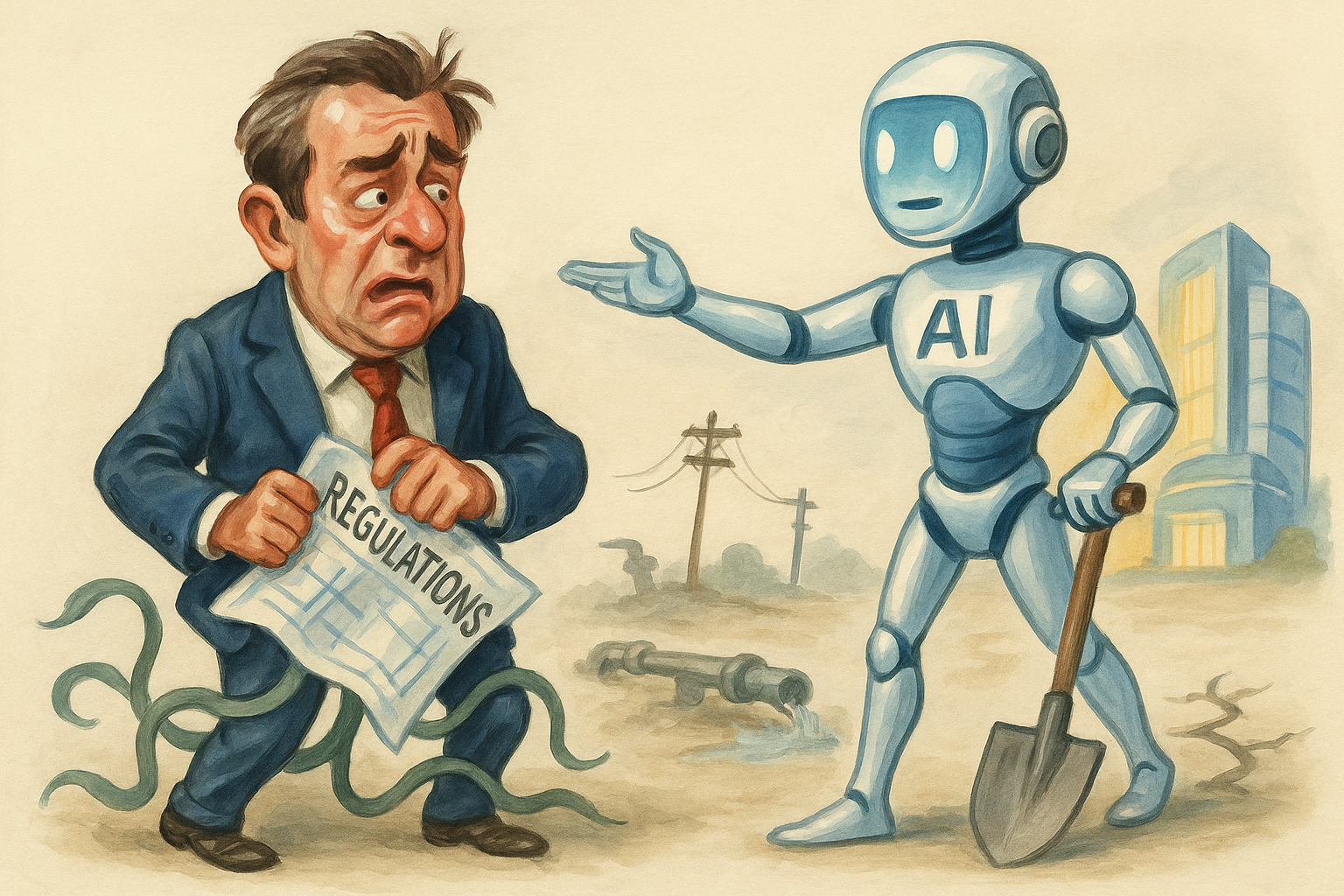- Our water infrastructure is in the toilet
- Our energy infrastructure is sabotaging us
- AI could get Britain building again
I love it when politicians complain that, “We can’t build anything in Britain anymore.” Who do they think caused the problem? Who do they think could fix it? Who is the only one with a budget big enough to overcome it?
Germans have an idiom for this type of hypocrisy. People who blame their sticky situation on “the ghost who poops in other people’s pants” are derided for it. Parliament is full of such ghosts, apparently.
Not that the rest of us are any better. We point out the lack of experience in the cabinet…that we elected.
Maybe this is a feature, not a bug. Perhaps MPs are elected on the basis that we want to get rid of them. Nobody in their electorate wants to work with them, live next door or serve them lunch.
And so we send them all off to a place called Westminster for most of the year to bicker with each other. Better than wreaking havoc locally.
We hope they can’t do too much damage while in Parliament. The constitution is supposed to constrain them.
But over time, the regulatory morass they constructed has become so convoluted that even governments can’t get anything done.
And so our trains are a joke, our waterways have reverted to sewers and our electricity infrastructure shuts down the airports it’s supposed to keep open.
Our utilities ask us to use less water and energy instead of providing enough. They might soon ask us for the power from our home batteries.
We are in managed decline. And those responsible are complaining about it the most.
Like an entrepreneur who can’t figure out how they’re supposed to comply with contradictory regulations, governments have no idea how to actually create anything. Even their precious energy transition is stuck.
But I have good news.
Change is afoot
The real question is what fixes all this. What motivates people, even in the civil service, to get things done?
Is it self-interest? The promise of rewards for those who do better.
That seems to be working for Javier Milei. The benefits of tearing up red tape eventually became undeniable.
Perhaps it’s the hope of building an empire? The British civil service was supposedly rather brilliant once. Perhaps it was because they had a cause.
The Japanese modernised during the Meiji Restoration in the hope of competing with European empires, too.
But that’s not so fashionable anymore… Perhaps we could come up with a new cause that puts efficiency first?
Or maybe it’s just a cultural question. The Germans just care about efficiency and the Japanese just care about tech inherently.
But that doesn’t really solve the riddle. What motivates the Germans to be so efficient, the Japanese to be so…Japanese?
Lee Kuan Yew claimed air conditioning in public administration buildings was crucial. Europe still hasn’t caught up to Asia on that one…
Today, I’m going to give you my own theory. It is simple. As usual, everyone else has got it backwards…
Technology permits innovation, not the other way around
You might think that innovative societies are good at making the most out of technology. But I reckon causation lies the other way around. Transformative new technologies force countries to wake up and get their act together.
The Japanese only modernised because Western military technology humiliated them. Before that, they had the opposite reputation for technological adoption.
It took a long time for the steam engine to become what you think of when I write “steam engine”. If the tech had just continued pumping water out of coal mines, we wouldn’t have had the Industrial Revolution. The jump in technology forced open the doors of development.
Rather a lot of medical innovation came about by accident. Or had to be forced onto the medical establishment via bizarre episodes of self-experimentation.
My point is that we occasionally discover something so good that society demands it. And then we change how our civilisation works to adopt it.
I don’t know if I’m right about all this. But I do know it’s a rather useful way to think about Artificial Intelligence (AI) right now…
AI is about to unclog our drains and flood our electricity grid
No doubt you’ve heard the stories. There isn’t enough energy infrastructure to feed AI’s appetite. Governments are having to revise their estimates of electricity demand to account for AI. In some cases, from a managed decline to an increase – a real shift in what’s needed.
AI data centre companies are already trying to solve this problem independently. They’re busy building their own power plants because sucking so much power out of the local system risks destabilising it.
New technologies like small modular reactors are on the table.
What if AI ends up solving our broader energy problems by forcing nuclear power on us? But I’m getting ahead of myself.
Because you can now add water to the list of AI bottlenecks. The Telegraph reports:
Thames Water has warned that plans to build 100 new data centres across London and the South East will pile more pressure on its creaking infrastructure.
The utility giant said it had identified 108 “hyper or large” data centres that will drive up demand in its region, with bosses suggesting it will have to manage water supplies carefully to ensure there is no impact on households.
Each data centre is equivalent to thousands of homes being added to a water network, meaning the pipeline of new data centres is on par with a new small city being built.
Adding water supply is the only thing that never gets a mention. Because we all know you can’t build things in Britain.
But what if AI data centres begin to solve the problem too?
What do you want?
The British people now face a very direct choice. They can have AI by allowing large scale reforms to power and water infrastructure, or they can continue to live in a country where politicians complain “we can’t build anything anymore”.
AI may well be the thing that cracks the inertia of the great British state. It could unlock energy and water supplies by way of building more infrastructure and supply of both. But only if we let it.
The benefits of AI are substantial enough that it gives politicians the power to override constraints. The benefits outweigh the costs by enough of a margin to make a dominant case.
That’s why AI companies are now expanding into their peripheral industries. They’re buying up the companies that could push out AI into every other aspect of our lives. Not just water and power.
SMR companies were among the first target for AI’s earliest developers. SMR stocks are up hundreds of percent since AI investors began to make a move.
If you can figure out what their next target will be, you can profit as the bottomless wallet of AI companies bid up share prices.
Until next time,

Nick Hubble
Editor, Investor’s Daily




